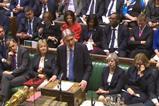Construction activity has shrunk in the second quarter as the uncertain environment has taken hold
The latest GDP figures from the Office for National Statistics showed that the UK economy grew by 0.3% in the second quarter of 2017.
This followed growth of 0.2% in the first quarter and has made economic forecasters more pessimistic about the economy’s prospects this year. For example, the Bank of England revised its forecast for annual growth down to 1.7% from 1.9% matching an earlier move by the International Monetary Fund.
The latest GDP figures also showed that construction shrank by 1.3% in the second quarter compared to the first quarter. Notable within these figures was the drop in private commercial work, which declined by 2% over the period. Other large declines were seen in infrastructure work which shrank by 0.5% over the period and other public work which, while a smaller sector, declined by 6.6%. The drop within private commercial is not surprising.
Private commercial work declined by 2% over the period
Contract award data from Barbour ABI had indicated a sharp fall in commercial office activity just after the Brexit referendum. While output remained relatively stable the theory was that commercial investors were happy to complete the existing pipeline of work. The question of future large scale investment, particularly in London, was always going to hinge on the outcome of the European Union exit negotiations.
That is not to say no office construction projects will start in London but the value of such contracts has been noticeably lower post referendum. For example, the first half of 2016 saw the commencement of the 22 Bishopsgate project which has a total project value of £550m and the Ten Bank Street project which has a £325m value. There have not been many projects of this scale beginning since the referendum last year.
If you look at the rest of the downturn within construction there are a number of factors which could be influencing lower activity. Within infrastructure for example, government investment decisions hold more influence than any Brexit-related factors. However, in a world of claim and counter claim when it comes to debating Brexit’s impact on the economy, it is clear that the uncertain environment is affecting activity levels in the high value London commercial office market.
Will this sound alarm bells within the corridors of power as the EU negotiations continue? It should.
Barometer online
You’ll find interactive, sortable league tables of contract wins on our Barometer site:
- Sort top contractors by region or sector
- Find out who the top consultants and architects are
- Get latest data for 10 sectors, including public housing and offices in the CPA/Barbour ABI Index
- Download raw data www.building.co.uk/barometer
































No comments yet